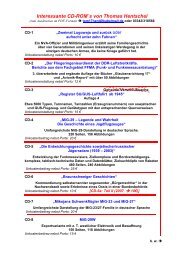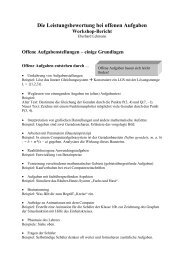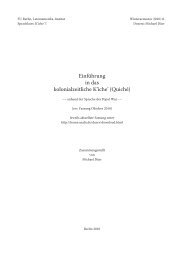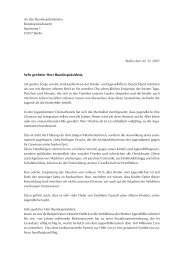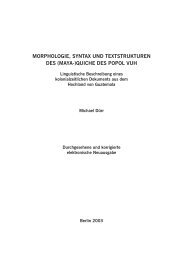SHADOW BOXING: INDONESIAN WRITERS ... - home . snafu . de
SHADOW BOXING: INDONESIAN WRITERS ... - home . snafu . de
SHADOW BOXING: INDONESIAN WRITERS ... - home . snafu . de
Create successful ePaper yourself
Turn your PDF publications into a flip-book with our unique Google optimized e-Paper software.
184 Marshall Clark<br />
without fixed characters or linear plots/' 107 However, the pastiche of "Lengsernya<br />
Rahwana" is not merely a reflection of the social and political chaos of the times, but<br />
also a pointer to the <strong>de</strong>velopment of a new conceptualization of what it means to be a<br />
meaningful citizen of Indonesia in the post-Suharto era. After Alengka is <strong>de</strong>stroyed<br />
and Rahwana <strong>de</strong>feated, his younger brother Wibisana is counseled by Rama. He is told<br />
to move beyond the past, and to look to the future, which will be of his own making.<br />
Rama explains that Wibisana's task is to rebuild the ravaged Alengka into a peaceful,<br />
prosperous, and just society, using the "Astabrata," or "eight steps' 7<br />
of lea<strong>de</strong>rship,<br />
"just like with The Seven Habits by that Stephen Covey, 108 but even better because this<br />
isn't just seven steps but eight!" 109<br />
Unlike Stephen Covey's pop psychology, the<br />
"Astabrata" is a mystical passage inclu<strong>de</strong>d in a nineteenth-century Javanese text<br />
based on the Ramayana, Serat Rama, written by Yasadipura I and <strong>de</strong>rived from an old<br />
Indian Sanskrit text. 110 Martin's version of the "Astabrata" is "updated" to suit the<br />
pro-Reform context. Each step involves following the example of a wayang god,<br />
including Indra's benevolent <strong>de</strong>votion to the provision of social welfare without<br />
resorting to nepotίsme (nepotism) or koncoίsm (cronyism); Yama's righteous <strong>de</strong>sire to<br />
establish a fair legal system without recourse to kidnappings and mur<strong>de</strong>r; Surya's love<br />
of learning and disdain for propaganda and indoctrination; Chandra's embodiment of<br />
morality and equanimity; Bayu's intimacy with the aspirations of the masses without<br />
resorting to the use of intel (state intelligence agents); Kuwera's ability to provi<strong>de</strong> an<br />
abundance of employment and sembako (the nine basic items of food and services);<br />
Baruna's dislike of violent and lawless behavior, especially at the hands of preman and<br />
gali (petty criminals and thugs) hired and equipped by the powers-that-be; and Agni's<br />
ability to eliminate any stumbling blocks against the establishment of social and<br />
political justice, such as politik adu domba (divi<strong>de</strong> and conquer politics). In Martin's<br />
version of the "Astabrata," Pertiwi, or the God<strong>de</strong>ss of the Earth, can act as a<br />
replacement for any of the other gods. This is because Pertiwi "supports and protects<br />
anybody fairly without any sort of KKN (Corruption, Collusion and Nepotism)." 111<br />
After Rama's explanation of the eight "steps" nee<strong>de</strong>d in his nation's recovery,<br />
Wibisana is enlightened, embol<strong>de</strong>ned, and ready to face an uncertain future with a new<br />
confi<strong>de</strong>nce. It appears that in "Lengsernya Rahwana" the transition to a new society<br />
must involve the lea<strong>de</strong>rship of an appropriate ksatrίa lea<strong>de</strong>r, such as an enlightened<br />
Wibisana. However, by the same token, the path ahead involves at least one major<br />
conceptual "rupture" or modification to the Ramayana's /csαίπα-orientation: the<br />
empowerment of the hitherto marginalized subordinate masses. As a reflection of this,<br />
not unlike the optimistic <strong>de</strong>nouement of Anak Bajang, the monkeys are portrayed as the<br />
107<br />
Michael H. Bod<strong>de</strong>n, "Notes on the Culture of the 'Reformasi Era,'" (unpublished manuscript, 1999), p.<br />
16.<br />
108 Stephen R. Covey is the author of The Seven Habits of Highly Effective People (New York: Simon and<br />
Schuster, 1989), as well as several other books on the psychological aspects of personal and financial<br />
success.<br />
109<br />
"mirip <strong>de</strong>ngan The Seven Habits dari Stephen Covey itu, tapi lebih ampu lagi karena ini bukan cuma<br />
tujuh melainkan <strong>de</strong>lapan!" Martin Suhartono, "Lengsernya Rahwana," p. 67.<br />
110<br />
Soemarsaid, State and Statecraft in Old Java, Appendix 3. See also Wahyati Pradipta, "Ajaran<br />
Kepemimpinan Astabrata/' in Ramayana: Transformasi, Pengembangan dan Masa Όepannya, pp. 154-165.<br />
111<br />
"menunjang dan melindungi siapa saja sama rata tanpa KKN (Korupsi, Kolusi, dan Nepotisme) apa<br />
pun!" Martin Suhartono, "Lengsernya Rahwana," p. 68.


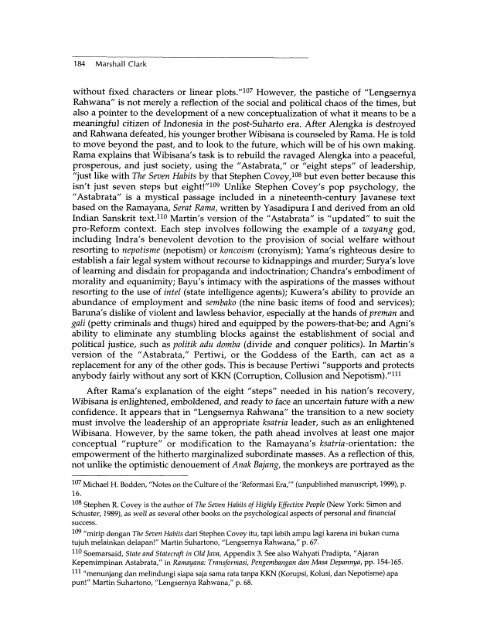
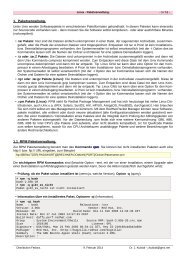
![Parameterdarstellungen [ x(t), y(t) ] Eberhard ... - home . snafu . de](https://img.yumpu.com/22517728/1/184x260/parameterdarstellungen-xt-yt-eberhard-home-snafu-de.jpg?quality=85)
